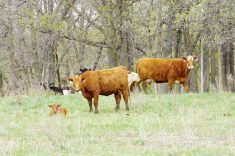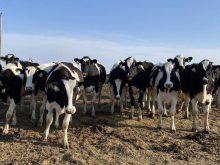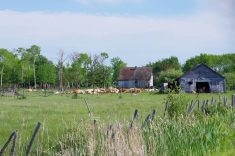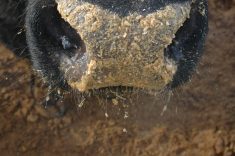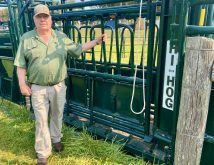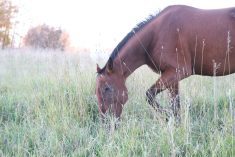John McKinnon’s studies into feed efficiency have increased competitiveness of the cattle industry
A desire to stay connected with rural life led John McKinnon to pursue a career in agriculture.
It has culminated in internationally respected research and innovation on beef cattle nutrition and management.
The researcher, professor and Saskatchewan beef industry research chair at the University of Saskatchewan is well known for advancing the competitiveness and sustainability of the beef industry in Canada.
His work most recently led to his being awarded the first annual Canadian Beef Industry Award for Outstanding Research and Innovation, which was presented this year at the Saskatchewan Beef Industry Conference.
Read Also

Farming Smarter receives financial boost from Alberta government for potato research
Farming Smarter near Lethbridge got a boost to its research equipment, thanks to the Alberta government’s increase in funding for research associations.
McKinnon was born in Russell, Man., the son of a jewelry and watch-maker.
He started working for Canada Packers in Winnipeg as a cattle buyer trainee shortly after graduating from the University of Manitoba with a degree in agriculture in 1978.
The job soon took him to Brandon and North Battleford, Sask., where he worked directly with feedlots and smaller cattle feeders.
After two years with Manitoba Agriculture, he earned a master’s degree in dairy nutrition from the U of S in 1986 and followed up with a Ph.D in 1992, which focused on the protein requirements of feedlot cattle.
McKinnon credits good timing and mentorship for steering him forward.
“I think I was just very fortunate in university that I met the right people. Dr. Bob Parker at the University of Manitoba encouraged me to go into agriculture, particularly from the point of view of job opportunities,” said McKinnon.
“The same thing with respect to my masters degree. People like Dr. (Charles) Williams and Dr. (David) Christensen were very much instrumental in moving me along in my academic career. Sometimes luck or good fortune takes you along different paths in life, I guess.”
Soon after completing his doctorate, McKinnon accepted the newly formed job of Saskatchewan beef industry research chair, which he has held since 1992.
McKinnon said he has witnessed constant change in livestock production during the past 35 years. He remembers finished steers weighing 1,200 to 1,300 pounds before the 1980s.
“The key thing is, yes, we’re taking animals to heavier weights today. There’s no doubt about that, but the fact is that we’re doing it in a more efficient manner. We’re using less feed to get the same amount of gain on these animals, and we’re meeting the quality expectations that consumers are looking for,” he said.
McKinnon’s research, coupled with industry involvement, has focused on feed utilization and accessibility of various byproduct feeds.
As the beef industry chair, McKinnon spends about 40 percent of his time with research and another 40 percent in extension related work, assisting industry with adoption of technology and development opportunities.
“That’s certainly an area that keeps one on their toes because those issues are always changing,” he said. “When they look to you for advice, you have to be up to date.”
One example is his ongoing in-volvement with Pound-Maker Ag Ventures at Lanigan, Sask.
“They were moving into an integrated ethanol cattle feeding complex, which was the first of its kind in Canada and North America,” he said.
The business needed to develop efficient feeding programs for cattle using wet byproducts.
Other industry partners in Sask-atchewan soon followed, which created dry byproducts for cattle.
“We’ve been involved with (processing) companies in a number of research projects that basically looks at defining the nutritional value of these byproducts that they can then market on an international basis.”
McKinnon said he looks forward to results from one of the university’s latest ventures, the Livestock and Forage Centre of Excellence.
The new beef cattle research facility at Clavet and Floral, Sask., scheduled for construction this summer, will be a combination of an intensive metabolic unit and feedlot as well as a cow-calf operation.
“Our opportunities for research are going to broaden dramatically,” he said.
McKinnon’s modest office at the university’s agriculture college includes a crowded shelf of graduate thesis projects. The red covered volumes amplify his dedication to research and mentorship for students.
He has supervised or co-supervised more than 35 master’s and doctoral students to program completion, as well as supervised several post-doctoral researchers.
Many have gone on to significant careers in the beef industry and research community.
“They’re back on the ranch, they’re in feedlots, they’re in government, they’re in universities and they’re in industry,” he said.
McKinnon’s impact stands out among a long list of dedicated researchers in Canada, said Tim Oleksyn, a cow-calf producer from Shellbrook, Sask., and chair of the Beef Cattle Research Council.
“He’s just such a leader in how he manages the science side, with academics, with students and any integration aspect through everything he touches,” he said.
“Where we presented the award, the stage wasn’t big enough to hold the number of people that would have wanted to thank him.”






